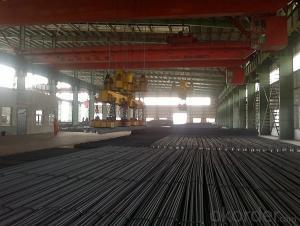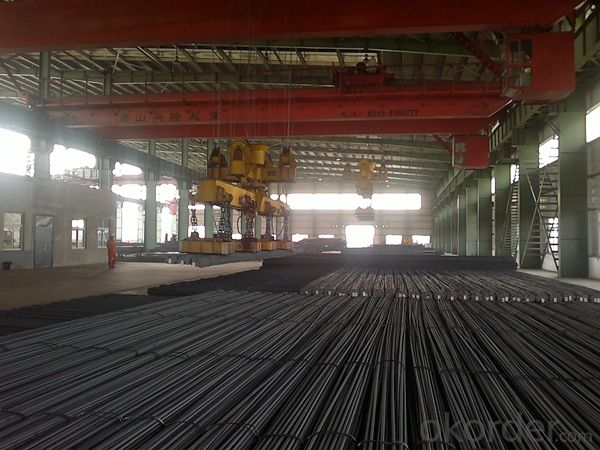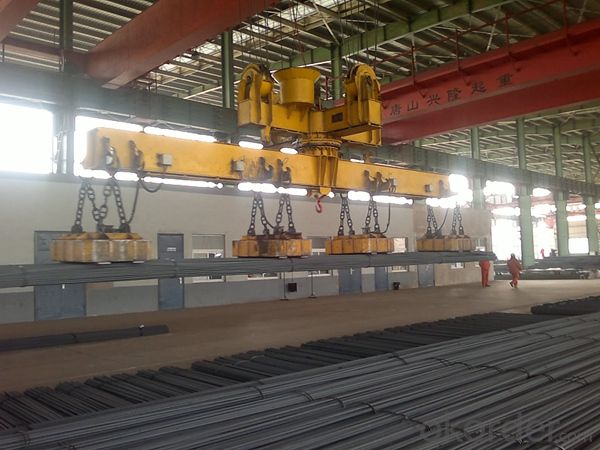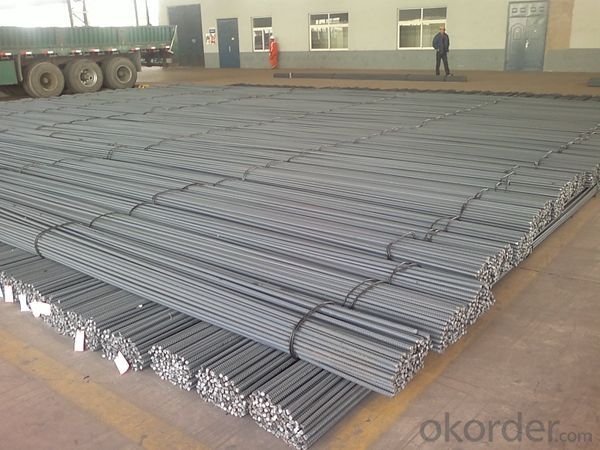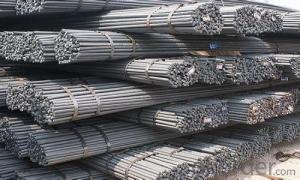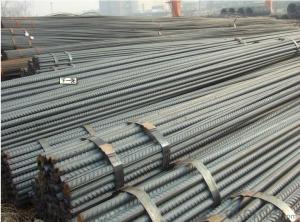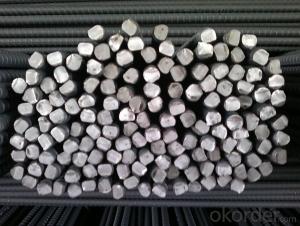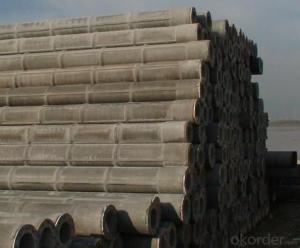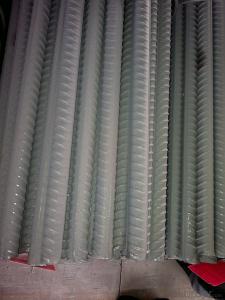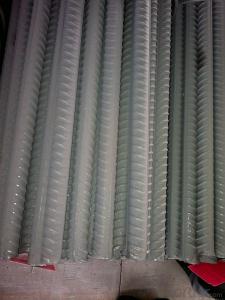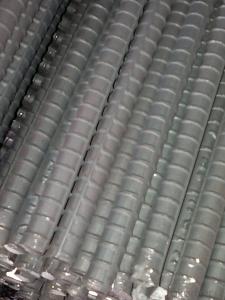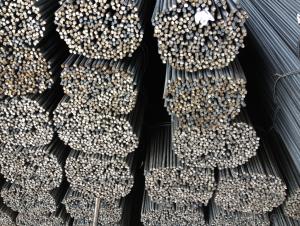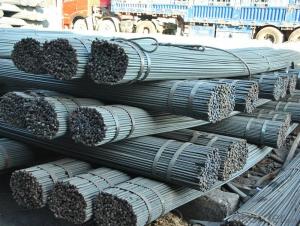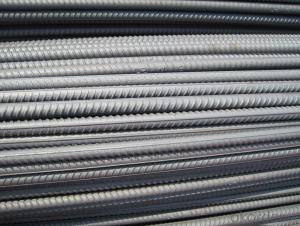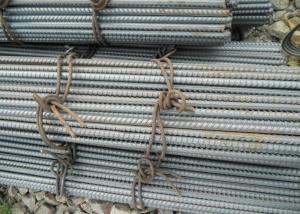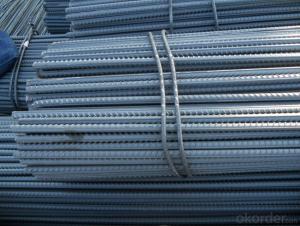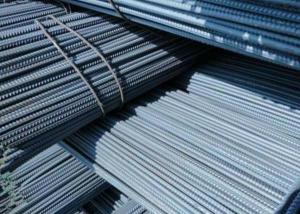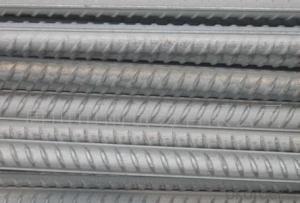Mild Hot Rolled Deformed Steel Rebars for Construction
- Loading Port:
- Tianjin
- Payment Terms:
- TT or LC
- Min Order Qty:
- 25 m.t.
- Supply Capability:
- 200000 m.t./month
OKorder Service Pledge
OKorder Financial Service
You Might Also Like
Product Description:
We are offering Mild Hot Rolled Deformed Steel Rebars for Construction at great prices with worldwide shipping. Our supplier is a world-class manufacturer of steel, with our products utilized the world over. OKorder annually supplies products to European, North American and Asian markets. We provide quotations within 24 hours of receiving an inquiry and guarantee competitive prices.
Product Applications:
Mild Hot Rolled Deformed Steel Rebars for Construction are ideal for structural applications and are widely used in the construction of buildings and bridges, and the manufacturing, petrochemical, and transportation industries. Deformed bar is widely used in buildings, bridges, roads and other engineering construction. Big to highways, railways, bridges, culverts, tunnels, public facilities such as flood control, dam, small to housing construction, beam, column, wall and the foundation of the plate, deformed bar is an integral structure material. With the development of world economy and the vigorous development of infrastructure construction, real estate, the demand for deformed bar will be larger and larger..
Product Advantages:
OKorder's Mild Hot Rolled Deformed Steel Rebars for Construction are durable, strong, and resist corrosion.
Main Product Features:
· Premium quality
· Prompt delivery & seaworthy packing (30 days after receiving deposit)
· Corrosion resistance
· Can be recycled and reused
· Mill test certification
· Professional Service
· Competitive pricing
Specifications of Mild Hot Rolled Deformed Steel Rebars for Construction:
Standard | GB UK USA | HRB335 HRB400 HRB500 G460B, B500A, B500B,B500C GR40, GR60 | |
Diameter | 6mm,8mm,10mm,12mm,14mm,16mm,18mm,20mm, 22mm,25mm,28mm,32mm,36mm,40mm,50mm | ||
Length | 6M, 9M,12M or as required | ||
Payment term | TT or L/C | ||
Trade terms | FOB, CFR, CIF | ||
Application | Building, construction | ||
Each bundle weight | 2-3MT, or as required | ||
Type | Hot rolled steel rebar | ||
Brand name | OKORDER | ||
Theoretical weight and section area of each diameter as below for your information:
Diameter(mm) | Section area (mm²) | Mass(kg/m) | Weight of 12m (kg) | Pcs/ton |
6 | 28.27 | 0.222 | 2.664 | 375.38 |
8 | 50.27 | 0.395 | 4.74 | 210.97 |
10 | 78.54 | 0.617 | 7.404 | 135.06 |
12 | 113.1 | 0.888 | 10.656 | 93.84 |
14 | 153.9 | 1.21 | 14.52 | 68.87 |
16 | 201.1 | 1.58 | 18.96 | 52.74 |
18 | 254.5 | 2.00 | 24 | 41.67 |
20 | 314.2 | 2.47 | 29.64 | 33.74 |
22 | 380.1 | 2.98 | 35.76 | 27.96 |
25 | 490.9 | 3.85 | 46.2 | 21.65 |
28 | 615.8 | 4.83 | 57.96 | 17.25 |
32 | 804.2 | 6.31 | 75.72 | 13.21 |
36 | 1018 | 7.99 | 98.88 | 10.43 |
40 | 1257 | 9.87 | 118.44 | 8.44 |
50 | 1964 | 15.42 | 185.04 | 5.40 |
Deformed Steel Rebar in warehouse
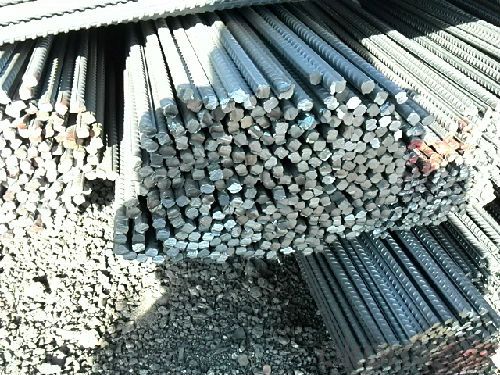
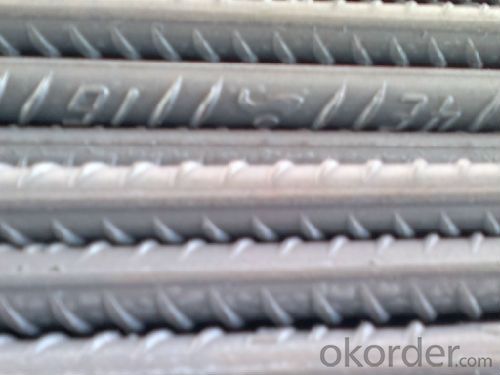
Packaging & Delivery of Mild Hot Rolled Deformed Steel Rebars for Construction:
Packaging Detail: products are packed in bundle and then shipped by container or bulk vessel, deformed bar is usually naked strapping delivery, when storing, please pay attention to moisture proof. The performance of rust will produce adverse effect.
Delivery Detail: within 45 days after received advanced payment or LC.
Label: to be specified by customer, generally, each bundle has 1-2 labels
Note:
1. Our products are produced according to national standard (GB), if not, supply according to national standards (GB) or agreement as customer required.
2. Other Grade and Standard Deformed Steel Bar we can supply:
Grade: GR40/GR60, G460B/B500A/B500B/B500C,BST500S
Standard: ASTM, BS, DIN
The Minimum Order Quantity of these products is high, and need to be confirmed.
3. We can not only supply Deformed Steel Bar; if you need anything about building materials, please contact us for further information.
4. Please send us your detail specifications when inquire. We will reply to you as soon as possible. We sincerely hope we can establish a long stable business relationship.
FAQ:
Q1: What is the normal tolerance of Hot Rolled Mild Steel Angle Beams for Structures and for Buildings?
A1: Normally 3%-5%, but we can also produce the goods according to the customers' requests.
Q2: Can fit in the containers of 20inches the steel beams of 6M?
A2: No proble, we can put them into the containers in the form sideling.
Q3: The products are invoicing on theoritical weight or on actual weight?
A3: We can do it in both manners, according to the customers' request
- Q: How do steel rebars affect the overall cost of maintenance and repairs?
- Steel rebars can have a significant impact on the overall cost of maintenance and repairs in various structures. Firstly, steel rebars are commonly used to reinforce concrete structures such as buildings, bridges, and highways. These rebars provide strength and durability to the concrete, helping to prevent cracks and structural failures. When it comes to maintenance, steel rebars can play a crucial role in reducing the frequency and costs of repairs. By reinforcing the concrete, rebars help to distribute stress and load evenly, minimizing the chances of structural damage. This means that maintenance and repair works will be less frequent, saving both time and money for property owners or infrastructure managers. Moreover, steel rebars also contribute to the longevity of structures. By preventing cracks and other forms of damage, rebars help to extend the lifespan of the concrete. This reduces the need for costly and extensive repairs or even the complete replacement of the structure in the long run. However, it is important to note that steel rebars may also require maintenance themselves. Over time, rebars can corrode due to exposure to moisture, chemicals, or environmental factors. This corrosion can weaken the rebars and compromise the integrity of the structure. Therefore, periodic inspection and maintenance of the rebars are necessary to prevent any potential issues. In conclusion, steel rebars have a significant impact on the overall cost of maintenance and repairs. While they contribute to the strength and durability of structures, reducing the need for frequent repairs, they also require their own maintenance to prevent corrosion. Properly maintained steel rebars can help to extend the lifespan of structures and save costs in the long term.
- Q: Can steel rebars be welded together?
- Yes, steel rebars can be welded together. Welding is a common method used to join steel rebars in construction projects, ensuring a strong and durable connection between the rebars.
- Q: Are there any standards or codes for steel rebars?
- Yes, there are indeed standards and codes for steel rebars. These standards and codes are essential to ensure the quality, safety, and compatibility of steel rebars used in various construction projects. One of the most widely recognized standards for steel rebars is the ASTM A615/A615M - Standard Specification for Deformed and Plain Carbon-Steel Bars for Concrete Reinforcement. This standard provides specific requirements for the physical and mechanical properties of steel rebars, such as chemical composition, yield strength, tensile strength, elongation, and bendability. It also includes guidelines for marking, packaging, and testing of rebars. In addition to ASTM A615/A615M, there are other relevant standards and codes used in different countries and regions. For example, in Europe, the European Standard EN 10080 - Steel for the Reinforcement of Concrete provides specifications for steel rebars, including dimensions, tolerances, and mechanical properties. Similarly, the British Standard BS 4449 - Steel for the Reinforcement of Concrete is widely used in the United Kingdom. These standards and codes not only ensure consistency in the manufacturing and production of steel rebars but also help architects, engineers, and construction professionals select the appropriate rebars for their projects. Compliance with these standards is crucial to guarantee the structural integrity, durability, and safety of reinforced concrete structures. It is important for stakeholders in the construction industry to be familiar with the relevant standards and codes for steel rebars and to consistently adhere to them. This helps to maintain high-quality construction practices and prevent potential failures or accidents due to substandard materials.
- Q: Can steel rebars be used in offshore platform construction?
- Yes, steel rebars can be used in offshore platform construction. Steel rebars are commonly used in the construction of offshore platforms due to their high strength and durability, which is essential for withstanding harsh environmental conditions, including strong waves, corrosive saltwater, and extreme temperatures. Additionally, steel rebars can provide structural reinforcement, ensuring the stability and integrity of the offshore platform throughout its lifespan.
- Q: How do steel rebars contribute to the overall durability and service life of concrete structures?
- Concrete structures benefit from the inclusion of steel rebars in several ways, contributing to their overall durability and service life. To begin with, steel rebars are utilized in concrete structures to bolster their tensile strength. While concrete is strong under compression, it lacks strength when subjected to tension. Incorporating steel rebars, which possess high tensile strength, into the concrete significantly increases the overall strength and load-bearing capacity of the structure. This enables the structure to withstand external forces such as wind, earthquakes, or heavy loads, thereby reducing the risk of structural failure and enhancing its overall durability. Additionally, steel rebars play a vital role in preventing cracking and controlling the spread of cracks within concrete structures. As concrete dries and undergoes temperature fluctuations, it has a tendency to shrink and crack. The presence of steel rebars helps to distribute these forces and stresses throughout the structure, minimizing the formation and expansion of cracks. By restricting the propagation of cracks, the rebars contribute to the overall structural integrity and longevity of the concrete structure. Moreover, steel rebars offer reinforcement against corrosion. Concrete possesses high alkalinity, which generates a protective layer known as the passivation layer around the steel rebars. This layer safeguards the rebars from rusting and corroding when exposed to moisture or aggressive chemicals. By preserving the integrity of the rebars, the overall durability and service life of the concrete structure are enhanced. Furthermore, steel rebars are instrumental in improving the structural stability and resilience of concrete structures. By providing reinforcement and rigidity to the concrete, they aid in the even distribution and dissipation of applied loads and stresses. This diminishes the likelihood of localized failure and augments the structure's capability to withstand external forces and deformations. The presence of steel rebars also enhances the structural behavior of the concrete, rendering it more resilient to dynamic forces such as vibrations or impacts. In conclusion, steel rebars make a significant contribution to the overall durability and service life of concrete structures. They enhance the tensile strength of the concrete, prevent cracking and control the propagation of cracks, provide reinforcement against corrosion, and improve structural stability and resilience. By integrating steel rebars into concrete construction, engineers can create robust and long-lasting structures capable of withstanding various challenges, ensuring the safety and longevity of the built environment.
- Q: What is the role of steel rebars in basement wall construction?
- Steel rebars play a crucial role in basement wall construction by providing reinforcement and structural support to the concrete wall. Reinforcing bars, which are commonly made of carbon steel, are strategically positioned within the concrete prior to pouring. Their placement adds strength and stability to the wall, allowing it to withstand various external forces such as soil pressure and lateral forces. By distributing the load and forces that the wall may encounter, steel rebars prevent cracking or collapse under these pressures, ensuring the wall's durability and structural integrity. Additionally, they help control shrinkage and expansion of the concrete caused by temperature changes. By acting as a framework within the wall, the rebars limit the formation of cracks and maintain the overall stability of the structure. In summary, the inclusion of steel rebars significantly enhances the strength and durability of basement walls. They are essential for maintaining the integrity of the structure and safeguarding it against potential damage or failure.
- Q: What is the maximum length of steel rebars that can be manufactured?
- The maximum length of steel rebars that can be manufactured depends on various factors such as the manufacturing process, transportation limitations, and practical considerations. However, in general, steel rebars can be manufactured up to lengths of around 60 feet (18 meters).
- Q: What are the guidelines for preventing steel rebars from rusting during construction delays?
- In order to prevent steel rebars from rusting during construction delays, it is crucial to adhere to the following guidelines: 1. Adequate Storage: Rebars should be stored in a covered and dry area, away from moisture and direct sunlight. It is important to ensure that the storage area is well-ventilated to avoid condensation. 2. Use of VCI (Volatile Corrosion Inhibitor) Products: Incorporate VCI products such as VCI paper, films, or emitters. These products release chemicals that inhibit corrosion and create a protective layer on the rebars, preventing rust formation. 3. Proper Packaging: If rebars need to be transported or stored for a long period, it is essential to package them correctly. Wrap the rebars tightly with VCI paper or plastic sheets and secure the packaging with tape to prevent moisture from seeping in. 4. Dehumidification: Install dehumidifiers in areas where the rebars are stored to reduce humidity levels. This will help maintain a dry environment and prevent condensation on the rebars. 5. Regular Inspection: Conduct periodic inspections to check for any signs of rust formation on the rebars. If rust is detected, it should be promptly cleaned and treated with anti-corrosion coatings to prevent further damage. 6. Application of Protective Coatings: Apply anti-corrosion coatings on the rebars to provide an additional layer of protection. The choice of coating, whether epoxy-based or zinc-based, should depend on the environmental conditions and project requirements. 7. Eliminate Standing Water: Make sure there is no standing water in the vicinity of the rebars, as it can expedite the rusting process. Implement proper drainage systems to prevent water accumulation. 8. Monitoring: Regularly monitor the environmental conditions, including temperature and humidity levels, to identify any potential risks of rust formation. Adjust the storage conditions accordingly, if necessary. By adhering to these guidelines, construction delays can be effectively managed, and the steel rebars can be safeguarded from rust formation, ensuring the structural integrity of the project.
- Q: Can steel rebars be used in sports stadium construction?
- Yes, steel rebars can be used in sports stadium construction. Steel rebars are commonly used as reinforcement in concrete structures, including sports stadiums, to enhance the strength and durability of the overall construction. The strong and durable nature of steel rebars makes them ideal for withstanding the heavy loads and stresses that sports stadiums often experience.
- Q: How are steel rebars protected against accidental damage during construction?
- Steel rebars are typically protected against accidental damage during construction by placing them within forms or molds made of wood or metal. These forms act as a protective barrier and prevent any accidental impact or disturbance that could potentially damage the rebars. Additionally, rebars can also be covered with plastic or foam materials to provide an extra layer of protection during the construction process.
Send your message to us
Mild Hot Rolled Deformed Steel Rebars for Construction
- Loading Port:
- Tianjin
- Payment Terms:
- TT or LC
- Min Order Qty:
- 25 m.t.
- Supply Capability:
- 200000 m.t./month
OKorder Service Pledge
OKorder Financial Service
Similar products
Hot products
Hot Searches
Related keywords
